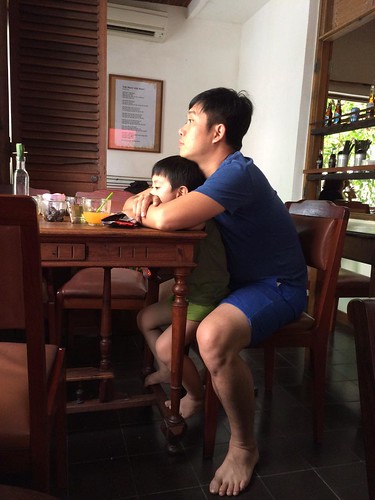He had heard three people say the same thing. Different perspectives.
His Father:
A man from the time of war, carrying the remnants of battle—a head streaked with smoke stains fading into disheveled hair, a shard of shrapnel lodged in his skull as a “gift” for his mother, delivered on a rainy day when he returned from the frontlines.
Pain. The echoes of war haunted him, flaring up with every cold wind or rainstorm, carving deep furrows across his forehead like rippling waves of skin, layer upon layer.
Once a young man, wearing a white uniform and scribbling poems sent to friends—innocence woven into verse. Those poems, now tucked away in the chest of memories, accompanied by letters from the rear he had once received. He had departed with a white uniform, only to return clad in the green of forest camouflage.
The letters traveled back and forth, their love as free as clouds carried by the wind. Among them, a promise: to return home with betel leaves and areca nuts as a token of a formal visit.
He met her. Standing at the edge of a narrow street, leaning against a crumbling brick wall, their gazes locked, sinking deeply into each other's hearts.
Subtle fragrance. Their love bore fruit: a healthy baby boy born with a congenital defect, a shared pain that resonated with every storm, every cold wind brushing against his fragile body.
Consolation. The father said, “Men must not cry!”
His Mother:
A daughter of the war-torn era, carrying in her mind the scars of conflict and in her chest a box of worn poems and love letters aged by time.
She fell in love. A boy with a clumsy head of hair sitting quietly in the corner of the class, his whispered affection expressed through letters and poetry.
Naïveté. Friendship took flight, and love remained—letters sent from the battlefield traced paths of longing.
Her lover returned, wearing a camouflage uniform stained with the marks of war—scratches from bombs, tears from bullets, coated with dust from countless battlefields.
Through loving eyes, she found peace in his weary gaze, though bloodshot with grief.
Gently, her hand touched his sun-worn cheeks but dared not brush his eyes, fearing any tear that might fall would shatter the soul of a soldier whose courage had withstood all manner of suffering, including the torment born of love—a child who now writhed in pain amidst stormy winds and rains.
Unyielding. She gazed at him, burdened by the remnants of war etched permanently in his mind.
When the time came, she placed a trembling hand over his weary face and closed his eyes. She let him rest, free from the pain of a tumultuous world, while their oblivious child ran circles around his coffin. She burned all their shared memories—gold paper turned to ash—as cold tears silently streamed down her cheeks.
Bereft. That son, now a man, still bore the scars of his condition, sitting beside his mother’s bed as the cruel passage of time tore through her frail body. Eighteen years and a handful of days later, she asked him to read her old letters and poems one last time before bidding farewell.
With trembling hands, she touched his angular cheekbones, gazing lovingly into his eyes bloodshot with anguish. She whispered, “Men must not cry!”
Her:
A frail figure with a bony face, sunken eyes behind thick glasses. Her thoughts wandered as she penned words flowing from emotions colored by the kaleidoscope of life.
She met him. In a quiet corner of the lecture hall, he sketched bizarre, otherworldly forms—paintings with chaotic colors and rebellious compositions defying conventional perspectives.
Gentle. She sat beside him, watching his sketches, mixing paints, and writing something indistinct. At times, she sang—a fragment of a melody from wartime ballads—letting her soul drift with the music.
She didn’t know when it began: her fragile body leaning against his, singing and writing feelings inspired by chaotic, colorful paintings that broke all norms.
Heart-wrenching. The heavens wept as rain cascaded down in torrents; the earth opened to receive the body of a woman who had endured war and drained her strength in this temporary world.
Farewell. Only two heads remained, bowed together in the rain-soaked evening.
She said, “Cry, so I may wipe your tears.”




Không có nhận xét nào:
Đăng nhận xét